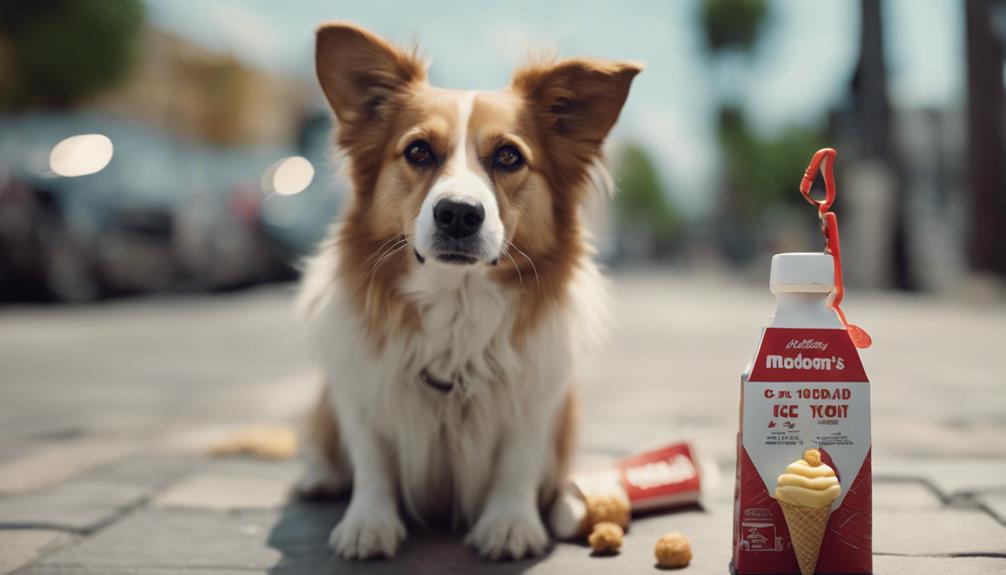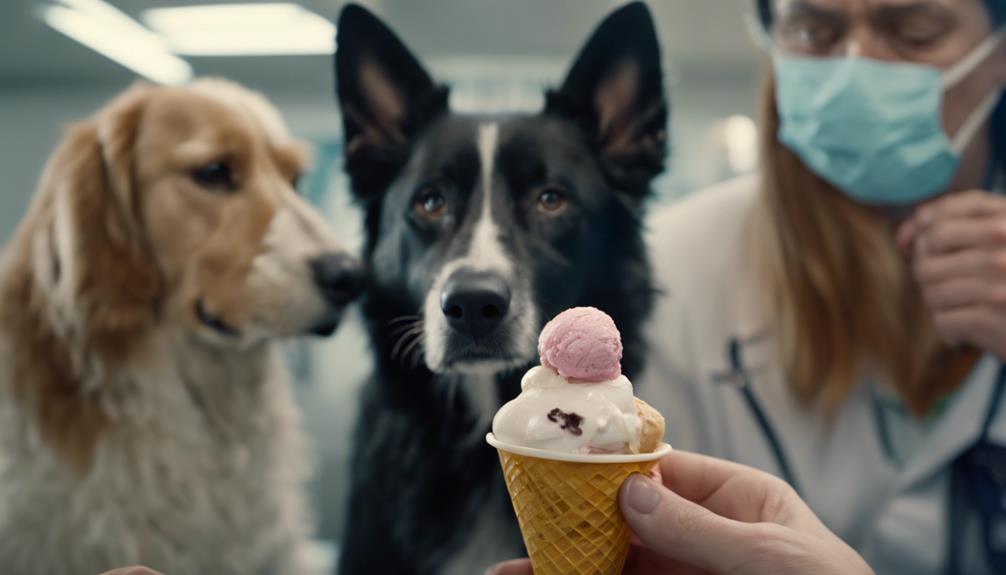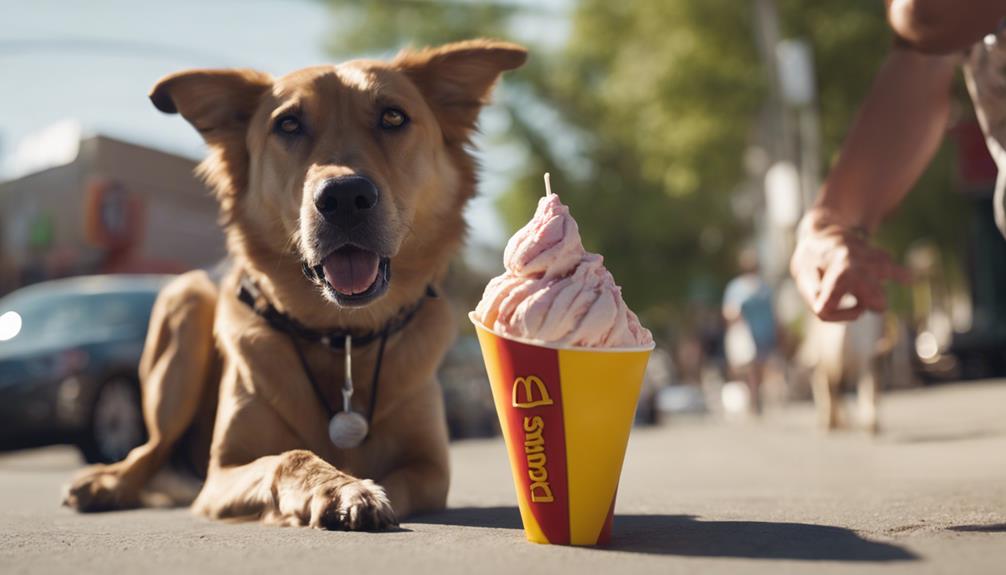If you are concerned about the possibility of McDonald’s ice cream being harmful to your dog, rest assured! Their soft serve does not contain xylitol, which can be dangerous for dogs. Remember to always double-check for xylitol in products before giving them to your pup. Immediate veterinary care is crucial if your dog consumes xylitol. To prevent any risks, be careful about the human foods your pet eats. Learn more about pet-safe treat options to keep your furry companion happy and healthy.
Key Takeaways
- McDonald's ice cream is safe for dogs as it does not contain xylitol.
- Pet owners should always check for xylitol in products before feeding them to dogs.
- Monitoring portion sizes and watching for distress signs in dogs is crucial.
- Consider pet-friendly treats designed for dogs to avoid health issues.
- Consulting a veterinarian for pet nutrition advice is recommended for safe treat choices.
Xylitol in McDonald's Soft Serve

When considering pet safety, it's important to note that McDonald's soft serve ice cream doesn't contain xylitol, a harmful sugar substitute for dogs.
Unlike some sugar-free products like gum and candies, McDonald's confirms that their soft serve is free from this ingredient toxic to dogs.
Xylitol, if ingested by dogs, can lead to severe health issues such as hypoglycemia and liver failure.
This makes it essential for pet owners to be vigilant about checking for xylitol in products before allowing their dogs to consume them.
Dangers of Xylitol to Dogs

Xylitol poses significant risks to dogs, potentially leading to severe health complications like hypoglycemia and liver failure if ingested. This sugar substitute is highly toxic to our canine companions, and even small amounts can be harmful, possibly causing life-threatening issues.
Xylitol can be commonly found in sugar-free gum, candies, certain peanut butter brands, and various sugar-free products. It's essential for dog owners to be aware of products containing xylitol and take precautions to prevent their pets from ingesting this harmful ingredient.
If a dog accidentally consumes xylitol, immediate veterinary care is vital to avoid serious health consequences. McDonald's, as a popular food chain, must also be vigilant and aware of the dangers xylitol poses to dogs, ensuring they properly warn customers about products containing this toxic ingredient. Being informed and cautious about xylitol can help safeguard your furry friend's well-being and prevent any potential health risks.
McDonald's Response to Xylitol Concerns

McDonald's has reassured customers that their soft serve ice cream doesn't contain xylitol, addressing concerns about pet safety.
A McDonald's spokesperson clarified that despite online posts warning about their ice cream containing xylitol, these claims are false. The company took swift action to debunk the misinformation and emphasize their commitment to ingredient quality and customer trust.
Social media played a role in spreading these inaccuracies, but McDonald's proactive response helped quell concerns and maintain transparency. By swiftly addressing the issue, McDonald's demonstrated their dedication to ensuring the safety of their products and the well-being of their customers' pets.
This incident serves as a reminder of the importance of fact-checking information before spreading it further, especially when it pertains to the safety of beloved pets.
Importance of Fact-Checking

Ensuring accuracy through fact-checking is necessary to prevent the spread of misinformation and maintain trust in information sources.
In today's digital age, where social media platforms serve as primary channels for information dissemination, the need for fact-checking has become more important than ever. Misinformation can easily find its way to thousands of people within seconds, potentially leading to harmful consequences if not corrected promptly.
Verifying information from reliable sources is crucial to avoid believing false claims and sharing inaccurate information unwittingly. Consumers play a significant role in this process by taking the time to verify the information they come across before believing and sharing it.
Impact of Misinformation on Brands

Addressing misinformation promptly is important for safeguarding your brand's reputation and consumer trust. False claims can spread rapidly on social media, impacting sales and loyalty.
Taking proactive steps to debunk misinformation is essential for maintaining a positive image and credibility in the eyes of your audience.
Misinformation's Brand Impact
Combatting misinformation is essential for safeguarding a brand's reputation and maintaining consumer trust in today's digital age. When false claims circulate about products like McDonald's ice cream being toxic to pets, the brand's image can suffer. Misinformation can harm a brand's reputation and trust among customers.
Misinformation can quickly spread through social media channels, influencing how the public perceives a company. Companies must address false claims quickly to protect their image and credibility. Social media can rapidly spread misinformation, impacting a brand's perception.
To mitigate the impact of false information, brands must address these claims promptly and transparently. By providing accurate information and correcting misconceptions, companies can rebuild trust with their customers. Transparent responses to false information can help rebuild trust with consumers.
Monitoring online conversations and actively correcting misinformation is crucial for preserving a positive brand image and ensuring that consumers have confidence in the products and services offered. Monitoring and correcting misinformation online is crucial for maintaining a positive brand image.
Handling False Claims
Misinformation circulating about products like McDonald's ice cream being harmful to pets can greatly impact a brand's reputation and consumer trust. False claims suggesting that McDonald's ice cream contains xylitol, a sweetener dangerous for dogs, can spread rapidly and damage the company's image.
For pet owners, the idea that a popular treat could pose a threat to their beloved animals can be alarming and lead to a loss of confidence in the brand.
When faced with such false allegations, it's vital for companies like McDonald's to address the misinformation promptly and transparently. By clarifying that their ice cream doesn't contain xylitol and is safe for pets, they can mitigate the potential harm caused by these rumors.
Proactively monitoring online discussions and swiftly correcting any inaccuracies is essential for protecting the brand's reputation and rebuilding trust with customers and the public. In the age of social media, where misinformation can quickly spread, addressing false claims effectively is key to safeguarding a brand's image.
Social Media Influence
Social media serves as a powerful tool for disseminating information, both accurate and misleading, which can greatly impact the reputation and trust of brands like McDonald's. Misinformation on social media can quickly spread false claims about brands, tarnishing their reputation and credibility.
Companies like McDonald's must address misinformation promptly to safeguard their image. Social media platforms play a significant role in amplifying misinformation, reaching a wide audience rapidly and potentially causing harm to a brand's reputation.
Transparently responding to misinformation is pivotal for rebuilding trust and credibility for brands like McDonald's. Monitoring online narratives and addressing misinformation promptly is essential for maintaining a positive brand image.
- Misinformation can spread false claims about brands.
- Companies need to address misinformation promptly.
- Social media amplifies misinformation widely.
- Transparent responses can rebuild trust.
- Monitoring online narratives is pivotal for brand image maintenance.
McDonald's Ice Cream Ingredients

What ingredients make up McDonald's soft serve ice cream?
McDonald's soft serve ice cream primarily consists of dairy products such as milk and cream. It doesn't contain xylitol, a sugar substitute that can be toxic to dogs.
The absence of xylitol in McDonald's ice cream guarantees its safety for pets when consumed in moderation. McDonald's has explicitly stated that xylitol isn't listed as an ingredient in their ice cream, addressing any concerns about potential harm to dogs.
This clarification from McDonald's emphasizes the importance of verifying information before assuming certain ingredients are present in their products. By confirming the safety of their ice cream for pets, McDonald's provides pet owners with peace of mind when treating their furry friends to a delicious soft serve ice cream.
Frequently Asked Questions
Can Dogs Have a Small Amount of Mcdonald's Ice Cream?
You can give your dog a small amount of McDonald's ice cream, but be cautious of potential digestive issues due to lactose intolerance. Moderation is key to avoid upsetting your pup's stomach.
How Quickly Can Xylitol Poisoning Symptoms Appear in Dogs?
When dogs ingest xylitol, symptoms of poisoning can appear rapidly. Remember, like a bolt of lightning, xylitol toxicity can strike within 30 minutes to an hour, causing serious health issues for your furry friend.
Is Xylitol Found in All Flavors of Mcdonald's Ice Cream?
Yes, xylitol is not present in all flavors of McDonald's ice cream. It's important to carefully check the ingredients list before feeding any ice cream to your dog. Always prioritize your pet's safety and avoid potential risks.
What Should I Do if My Dog Ingests Mcdonald's Ice Cream?
If your dog ingests McDonald's ice cream, monitor for symptoms like vomiting or diarrhea. Contact your vet immediately for guidance. Remember, better safe than sorry! Keep your furry friend safe and healthy at all times.
Are There Alternative Ice Cream Options Safe for Dogs?
For your dog, opt for dog-friendly ice creams or make homemade frozen treats using safe ingredients like plain yogurt, peanut butter, or bananas. Always check for xylitol or chocolate, harmful to dogs. Enjoy making special treats together!
Can Dogs Safely Eat McDonald’s Ice Cream or Should I Stick to Dog-Specific Treats?
When it comes to “buy dog ice cream uk,” it’s best to stick to dog-specific treats. While McDonald’s ice cream may seem tempting, it can contain ingredients harmful to dogs, such as artificial sweeteners. Opt for specially made dog ice cream to ensure your furry friend stays safe and healthy.
Can Dogs Safely Eat Ice Cream from an Ice Cream Truck?
If you’re wondering about the safety of letting your dog enjoy a sweet treat from an ice cream truck, it’s best to err on the side of caution. While some ice creams may be safe for dogs in small amounts, it’s important to research and find ice cream truck near you that offers dog-friendly options.
Conclusion
So, next time you're thinking about treating your furry friend to some McDonald's ice cream, remember to double-check the ingredients for xylitol. It's always better to be safe than sorry when it comes to your pet's health.
And remember, a little research can go a long way in keeping your four-legged companion happy and healthy. Stay informed and keep those tails wagging!









